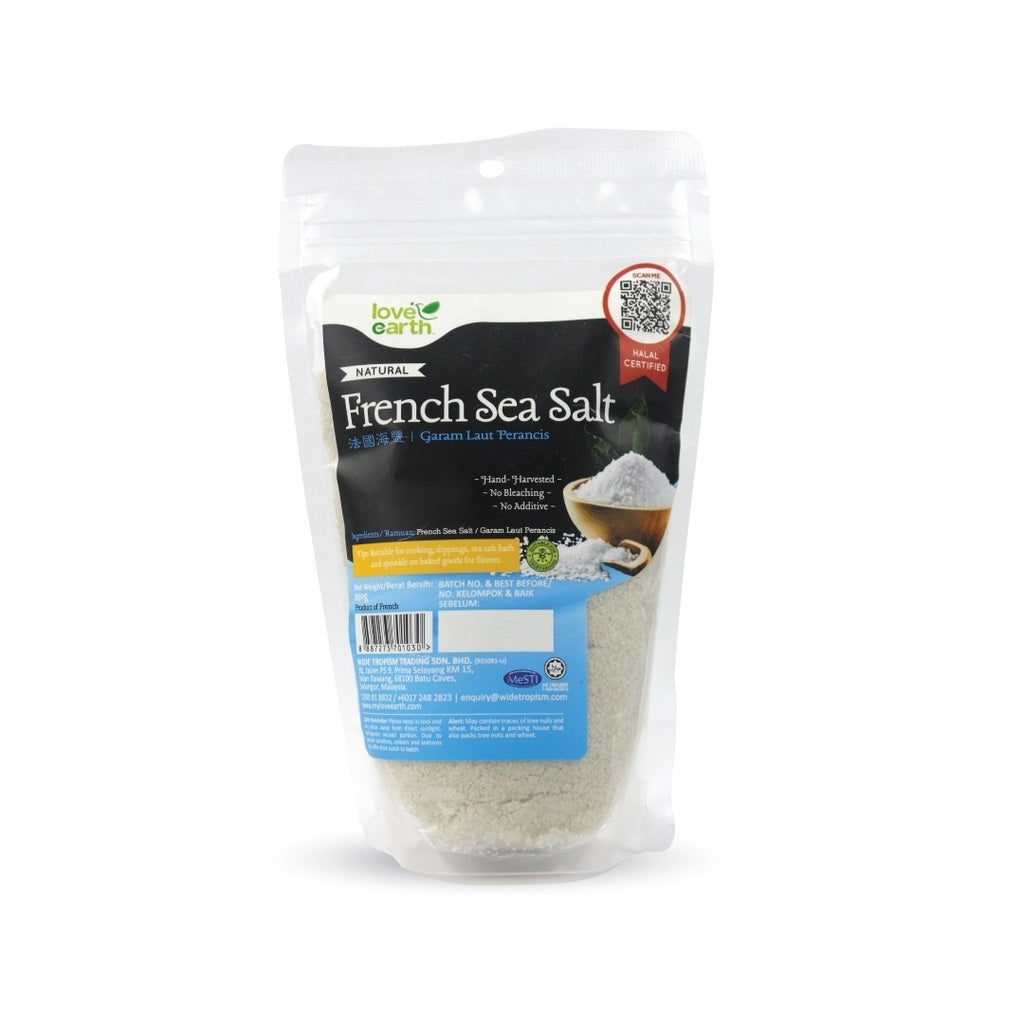LE French Sea Salt (Fine) 300g
LE French Sea Salt (Fine) 300g
100% Natural (No Chemicals & Preservative)
Retain its mineral content such as iron, magnesium, potassium, and calcium
Regulate fluid balance, blood pressure, and improve digestive system
Jakim HALAL Certified, KKM MESTI Certified
Description
This french sea salt, also known as Sel De Guerande in France, is a unique type of salt with a rich history. It has a fine texture and a delicate flavour with greyish white coloured granules. It is made by collecting evaporated salt from the surface of seawater where it is dried and grounded.
Ingredients
100% Fine Sea salt / Sel de Guérande
Benefits
![]() Unprocessed which lets the salt retain its minerals such as potassium, iron and calcium
Unprocessed which lets the salt retain its minerals such as potassium, iron and calcium
![]() Sea Salt mostly contains sodium chloride which maintains fluid balance and blood pressure
Sea Salt mostly contains sodium chloride which maintains fluid balance and blood pressure
![]() Sodium chloride can also promote a healthy digestive system as it aids the nutrients that have been broken down in the body to be absorbed and transported during digestion
Sodium chloride can also promote a healthy digestive system as it aids the nutrients that have been broken down in the body to be absorbed and transported during digestion
![]() Can be used as a salt bath where it can decrease dryness and inflammation of the skin
Can be used as a salt bath where it can decrease dryness and inflammation of the skin
![]() Saltier in taste due, thus, a lesser amount is needed to season your food; Leading to lower salt consumption
Saltier in taste due, thus, a lesser amount is needed to season your food; Leading to lower salt consumption
Country of Origin
France
Certs / Awards
![]() Jakim HALAL Certified
Jakim HALAL Certified
![]() KKM MESTI Certified
KKM MESTI Certified
Recommended Serving Size
![]() ¼ teaspoon (1.5g) per serving
¼ teaspoon (1.5g) per serving
![]() 1 teaspoon (less than 5g) per day
1 teaspoon (less than 5g) per day
What our nutritionist says
It is true that sea salt has a higher mineral composition than regular table salt. However, do note that it is not enough to meet your nutritional needs. Excessive consumption of sodium can lead to high blood pressure and an increase in the risk of heart problems. Therefore, for adults, the recommendation was that individuals should not eat more than 5 g of salt per day (2,300 mg sodium).
FAQ
1. How is this different from regular table salt?
The main difference is that Sea Salt is unprocessed, which means that its minerals are retained. While regular table salt is heavily processed, thus, most of its nutrients are removed. Even though both salts have similar sodium content, french sea salt has a saltier taste, therefore, you will naturally use less of it in compared to table salt
2. Are all your salts iodized?
Yes, all our salt products are iodized.
Mommy’s corner
![]() 0 - 10 months old: giving your baby salt should be avoided at this age. Babies can already get the sodium needed from breast or formula milk
0 - 10 months old: giving your baby salt should be avoided at this age. Babies can already get the sodium needed from breast or formula milk
![]() 10 - 12 months old: The maximum amount that can be given is 1g per day. It is not recommended to give more than this as their kidneys cannot cope with it. However, we recommend using mild spices instead of salt if your baby’s food tastes bland.
10 - 12 months old: The maximum amount that can be given is 1g per day. It is not recommended to give more than this as their kidneys cannot cope with it. However, we recommend using mild spices instead of salt if your baby’s food tastes bland.
![]() Above 12 months old: The maximum that can be given is 2g per day.
Above 12 months old: The maximum that can be given is 2g per day.
For pregnant women, the recommended salt intake is the same as everyone else. A daily maximum of 5g per day or 1 teaspoon of salt.
Suggested ways to serve
![]() Suitable to be used in cooking and as finishing salt to flavour or garnishing.
Suitable to be used in cooking and as finishing salt to flavour or garnishing.
![]() For salt baths: add 1 cup of sea salt to a warm bath.
For salt baths: add 1 cup of sea salt to a warm bath.
![]() As an exfoliating scrub: mix salt with oils, honey, or scrubs until desired consistency. Then gently massage the body and avoid delicate areas.
As an exfoliating scrub: mix salt with oils, honey, or scrubs until desired consistency. Then gently massage the body and avoid delicate areas.
Storage
Store at room temperature, dry place and away from direct sunlight
Table of comparison
| French Sea Salt | Korean Bamboo Salt | Himalaya Mineral Rock Salt | |
|---|---|---|---|
| Source | Evaporated Sea Water | Natural salt roasted in bamboo | Foothill of Himalaya |
| Features | Greyish white colour with a fine texture | White in colour with a fine texture | Pink in colour with a coarse texture |
| Mineral content | Mainly sodium chloride with some trace minerals | Variety of trace minerals | Variety of trace minerals |
| Benefits |
|
|
|
| Uses |
|
|
|
Share


